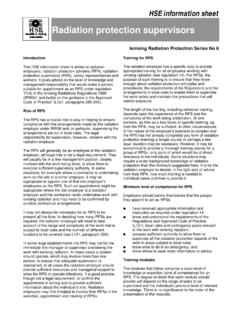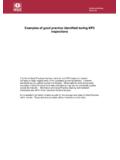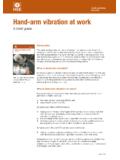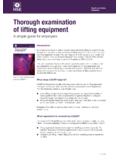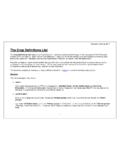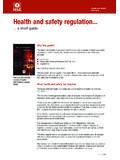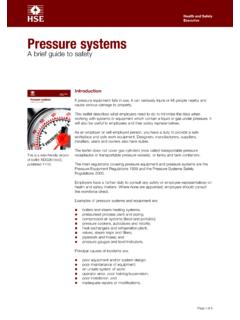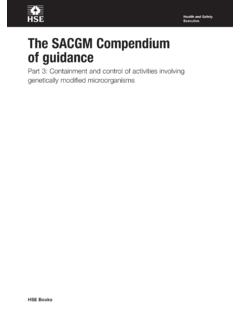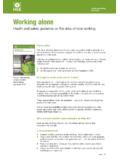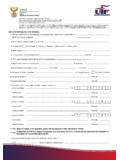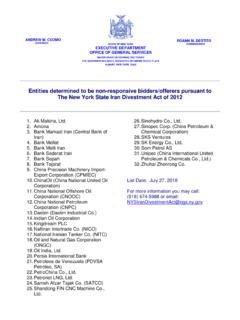Transcription of Disclosure of duty-holder/third party information …
1 Disclosure OF duty - holder / third party information provided TO HSE IMPLICATIONS OF THE FREEDOM OF information ACT 2000 AND THE ENVIRONMENTAL information REGULATIONS 2004 The Freedom of information Act 2000 (FOIA) and the Environmental information Regulations 2004 (EIR) introduced statutory rights of access to information held by public authorities, including HSE. You may wish to know what happens when HSE receives requests for information which was supplied to it by a third party , such as your organisation, : in compliance with a licensing regime; as a result of the exercise of inspectors statutory powers requiring you to do so normally in the course of an investigation or inspection; in compliance with a statutory requirement for instance, the Reporting of Incidents, Diseases or Dangerous Occurrences Regulations 1995 (RIDDOR) or the Control of Major Accident Hazards Regulations 1999 (COMAH).
2 FOIA and EIR place a duty on public authorities to make information available to the public on request unless one or more of the exemptions under FOIA, or exceptions under EIR, apply. In most cases, the public interest in maintaining the exemption must also outweigh the public interest in disclosing the information1. In these cases, when someone requests information , HSE must consider the public interest before it can refuse to disclose it, including information provided by third parties. Decisions on whether or not Disclosure of information that is subject to an FOIA/EIR request is required by law must be taken by HSE. Where appropriate, we aim to give you the opportunity to make representations, though it is HSE which has the legal duty to comply with FOIA and EIR and HSE must therefore take the final decision.
3 As the FOIA and EIR are fully retrospective, information provided to HSE before the legislation came into force will also be subject to the FOIA or EIR access rights. 1 More information on the exemptions can be found on the information Commissioner s website: Where a person requests environmental information , the request must be considered under EIR and not FOIA. The information Commissioner is of the view that the definition of environmental information is a wide one and has issued guidance that will help identify what is environmental information for the purposes of FOIA and EIR2. Consulting third parties Section 45 of the FOIA and Regulation 16 of the EIR provide for a Code of Practice to be issued to give public authorities guidance on discharging their functions under FOIA or EIR.
4 The Codes say that, even where it is not necessary to consult third parties who may be affected by a request for information , it is good practice to do so for the following reasons: consulting the source of the information may help HSE identify relevant exemptions or public interest factors; the third party may advise HSE to give the requester more context or explanatory material, or include copyright restrictions; contacting third parties in advance of any Disclosure will help them prepare for any effect on their work, for example press coverage or an increase in enquiries. Processing FOIA/EIR requests information requests under FOIA or EIR must be handled promptly by the public authority, which has 20 working days to respond to requests.
5 On receipt of a request for information : 1. HSE will establish whether it holds any of the information requested; 2. If it does, HSE will consider which legislation should apply (FOI or EIR). It will estimate whether the cost of complying with the request exceeds the appropriate limit under FOIA (in which case it may refuse the request) or whether under EIR the request is manifestly unreasonable . 3. HSE will then gather the information and consider whether any exemptions/exceptions apply (including the public interest factors for and against Disclosure ) and whether it should consult you or other third parties before a decision on Disclosure . Certain complex requests may require consultation with other public authorities.
6 4. If we think that the request covers third party information and it is practicable to do so, we aim to contact the third party if, for example: there might be commercial implications arising from disclosure3, the information appears to be confidential4. 2 What is Environmental information ? 3 Awareness Guidance No. 5 - Commercial Interests 4 Awareness guidance 2 - information provided in confidence We will let you know the date by which you need to provide us with any views you have on the request. If you consider that HSE should refuse the request, you will need to provide detailed reasons (see below). 5. Your response will be taken into account: in deciding whether to neither confirm nor deny that HSE holds the requested information ; in applying any exemptions/exceptions; and in applying the public interest test (where applicable).
7 6. If HSE has contacted you for your views and considers that HSE is required by the FOIA or EIR to disclose the information , despite your wishes to the contrary, we will normally inform you of this before releasing the information . Confidentiality and commercial sensitivity If HSE is to refuse a request for information on the grounds that Disclosure would prejudice the commercial interests of a third party (section 43 FOIA or regulation 12(5)(e) EIR), it cannot speculate on the harm that might be caused: the decision must be based on evidence from the third party that explains what the prejudice or adverse effect would be. It must also be in the public interest to refuse the request. Under EIR, the exceptions relating to confidentiality and commercial information (regulations 12(5)(d) and (e)) are not available to the extent that the information requested concerns emissions5.
8 Non-environmental information is also exempt if it was obtained by the public authority from another person and Disclosure would be an actionable breach of confidence (section 41 FOIA). Actionable means that an aggrieved party would have the right to take HSE to court as a result of the Disclosure . HSE can only consider relying on this exemption if it is satisfied that the information is confidential and an aggrieved party has legal standing to take action. As above, HSE will often have to rely upon evidence from the third party in reaching a view on whether the exemption applies. Differences under EIR EIR include an exception (Regulation 12(5)(f)) which allows information volunteered to a public authority to be withheld if its release would adversely affect the interests of the provider.
9 However, this cannot be relied upon where an inspector could have required the information using his or her statutory powers (even if s/he did not in fact do so). EIR specifically disapply any enactment or rule of law that would otherwise operate to prevent the Disclosure of the information . 5 The information Commissioner s view is that the term emissions could include past, present and future emissions: Freedom of information Unit information Management Unit Health and Safety Executive Revised: October 2010
